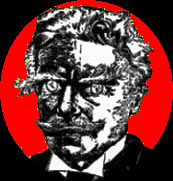|
Ambrose Bierce, in his customary vested black suit, courageously confronted the fire-breathing lizard, which wasn’t the only obstacle on our road trip to Carcosa. Even more annoying was the ominous SUV relentlessly pursuing us through Dixie, mile after mile, state after state.
Bierce and I were on a first-name basis. After more than a few libations, plus my obvious obsequiousness, he and I quickly became drinking pals, easy enough to do when two lonely old tellurians discovered the bottle was sometimes their only friend.
In many ways, I’d been a failure, not the least regarding my marital blunders. In addition, most of my literary efforts had been rebuffed, and I eked out a living, such as it was, by selling ads on my unprosperous, amateurish websites. Priced out of Manhattan, I survived in a two-bedroom rental in nowhere, Pennsylvania.
Bierce himself had been out of touch for an eternity, holed up somewhere beyond the border. Now back in the States for the first time since 1913, he knocked at my door unexpectedly, having learned—he wouldn’t say how—about the Internet, which often bandied his name, of which he was vain, complaining that no matter how much he’d been published he remained unknown.
I first thought my visitor was one or more Jehovah’s Witnesses, whom I was prepared to invite in, offer cookies and instant cocoa, and politely entertain in my solitariness, promising to read their pamphlets. But, nay, it was a tall, military straight, white-haired man I immediately identified through his flattering mustachioed photographs. Blunt as always, he got right to the point, wanting to engage me as a driver and a kind of guide. My tether frayed, and unprepared to steer for Uber, I bit at the opportunity.
“Donald, I don’t read pap, but I’m informed you’ve been writing about me on this Internet thing of yours.”
“I, I...”
“Calm yourself. I don’t intend to examine any of it, but best you remain on my good side. Otherwise, I might have to cane you.”
For a moment I was speechless.
“Are you not aware of cynical humor, Donald? It’s customary to laugh.”
I laughed, kind of.
“No, no, no. Laughter’s an interior convulsion producing a distortion of the features and accompanied by inarticulate noises. You’re not doing it correctly.”
Understandably, the Internet was unfathomable to him, yet, not being a Paleolithic cave dweller, he was cautiously willing to learn about computers and current technology. He’d been an early adopter of the typewriter, although he complained he was less than proficient, and managed only to inflict torture on both the machine and himself.
Intending to catch up on all he’d missed over the past hundred years or more, he proposed a sort of pilgrimage through the American South, a land he helped to conquer, eventually to wind up at some hidden sanctum, Carcosa, in Louisiana.
Clearly, when he saw my old but reliable Dodge Caravan, Bierce was skeptical, although I wasn’t sure whether he was suspicious of my driving ability or simply didn’t trust riding in a motorized vehicle. Maybe both.
“S’matter, Ambrose?” I teased. “They had cars in your day, didn’t they?”
“Don’t be a ninny, my most current and foremost friend. Then, autos were unreliable. Constant breakdowns, flat tires, complicated to operate. Had to crank to start ’em up. I’ll take a horse any day. A horse is the founder and conservator of civilization.”
“However, it’s the twenty-first century, so horses matter only for race tracks, carriage rides in the park, and glue.”
“In my time, the horse, as I once celebrated in rhyme, was indispensable.
What should we do without the steed
The good strong steed, the friendly steed?
He bore us from the barbaric night
Up the steep slope and into light
He served the purpose of our need.
So confident in horseflesh was I, that when the first horseless carriages made their appearance, I invested all I had on the makers of buggy whips.”
“In any event, Ambrose, our cars are better built than the clunkers you had, and they’re not all painted black. But you still gotta fasten your seatbelt. It’s the law.”
He bitched about it, but I told him the van wouldn’t start until the belt was buckled. I lied. How would he know? He fumbled with the snap before he got it latched, still complaining, which got us off to a rocky start as we hit the road. I saw how cantankerous he could be.
“Donald, I wish to revisit the spectral-hued mountains, teeming cities frenzied with ferment, the opaque splendor of the endless plains, majestic redwoods grazing the clouds, limitless tracks of steel rail, reeds undulating in tidal waters, the unremitting dynamic of all America.”
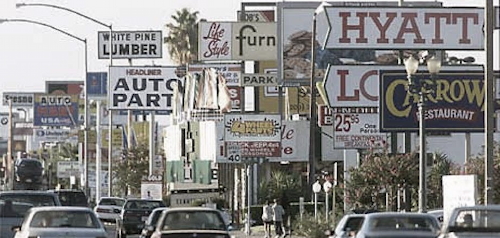
“I’m afraid your view will be marred by billboards, sprawl, storage units, and strip malls.”
“What the devil’s a strip mall?”
“Once we’re on the road you can’t miss ’em. Y’know, Ambrose, one might say you’re now encapsulating the future you would have experienced directly had you not fled to wherever you went. Sort of like time travel.”
I thought my remark was, for me, relatively profound, but the sly old dog wasn’t having it.
“Yours is convoluted thinking at its most narrow. The future’s the period of time when our affairs prosper, friends are true, and happiness is assured. Certainly you don’t think that ever applied to me?”
“Well...”
“More important, will it apply to you?”
I allowed his question to hang.
In silence, we zipped through the toll plaza of the Pennsylvania Turnpike without stopping, thanks to E-Z Pass.
“I noticed you failed to halt and remunerate the tolltaker.”
“Because on the windshield is a transponder that transmits data allowing the driver to pay by check or credit card.”
“Transponder? And what’s a credit card?”
“Uh, it’s complicated.”
“Can I acquire one?”
“You’d probably need a Social Security number.”
“A what?”
“I’ll explain later.”
Exiting the ramp, I navigated onto the interstate headed west. It didn’t take long to realize we were being followed, a black SUV that had been trailing us even before we went through the toll plaza. When I mentioned it to Bierce he patted the slight bulge under his coat.
“If they’re up to no good, I’m prepared. I’ve been packing this peacemaker since the old days. Keep it clean and free of rust, so it works like a Trojan with a hard-on. Whom do you think might be dogging us?”
“Maybe the border patrol. They’re fussy over who comes into the country these days, Mexicans in particular, rapists and drug dealers—as the current hallowed and distinguished eminence of our nation affirms.”
“That’s strange. After some of the hostilities along the border eased, no one fussed when I entered Chihuahua. Also, I never noticed that rapists and drug dealers were in greater supply in Mexico than America. In any event, I was certain when I knocked at your door I’d returned to the States undetected.”
We drove in silence. He was clearly disturbed by the thought that his cover may have been blown.
“Ambrose, let me distract you with a little music. Your favorite violin piece, perhaps?”
Cunningly, I tapped my smartphone’s screen and instantly from the car’s Bluetooth speakers came Dvorák’s sweet “Humoresque.”
“By Jupiter, I haven’t heard that melody for more than a century. No one would ever accuse this retired printer’s devil of sentimentality, but when I hear...” He wiped a faux tear from his eye. “Of course, when you come right down to it a fiddle’s an instrument employed to tickle human ears by the friction of a horse’s tail on the entrails of a cat. What the deuce is that small, noisy device anyway?”
“My phone, of course.”
He gaped in astonishment. “Without some wire leading from it and disappearing into a wall and then to god knows where?”
“We don’t need wires anymore.”
“Obviously, Donald, I’ve much to catch up on. But wires or not, the telephone’s an invention of the devil, which abrogates the old advantage of making a disagreeable person keep his distance.” He shook his head with its handsome crown of hair. “And by some devilish conspiracy, your utensil emits music as well? Unprecedented.”
“But not unlike the phonograph of your day.”
“The phonograph’s an irritating toy that restores life to dead noises. Your phone or whatever it is has got to be calamitous.”
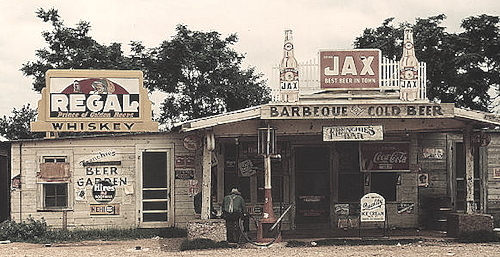
Many miles south after exiting the Turnpike we found ourselves on a rural road, the black SUV still on our tail. Nevertheless, Bierce insisted he needed a tope or three, so we paused at a ramshackle tavern festooned with barbecue, beer, and booze signs, and an ancient gasoline pump outside. While hops-favored beverages were the staple, he noticed on a shelf behind the bar a full bottle of Martell Three Star cognac.
The bartender, blowing the dust off the bottle and pouring a healthy slug into a glass, said, “Previous owner had this here hooch for a coon’s age, I think for payin’ off a bad debt. But nobody in these parts ain’t ever gonna drink it, so I’m glad to pare it down. Keep the bottle on the table, gents.”
Bierce and I sat across from each other, he sipping the cognac and I, because I was driving, nursing a Dr Pepper and bourbon.
“Donald, thank god Prohibition never came about, and those damnable Temperance hellions never got their way. The bitches.”
“Actually... We had thirteen years of it. The Eighteenth Amendment, an experimental hell that led to bootlegging, speakeasies, smuggling, carnage by Tommy gun, and disrespect for law in general.”
He look at me, incredulous. “Glad I had the good fortune to sleep through it—thanks to the grace of Providence, whoever the hell she is. I’ve always maintained that distilled spirits produce madness in total abstainers.”
We clinked glasses.
I said, “Hate to tell you this, but the ladies also got the right to vote.”
“What the Sam Hill? Where the devil has this country gone?”
“Yeah, a lot of changes, all right, yet you’re looking well for a man of your age. How old are you anyway, Ambrose? About one hundred seventy-five, I’d wager.”
“I’m in fine fettle, my friend. Age is when we defend our still-cherished vices, and revile the ones we haven’t the energy to commit.”
I heard the bartender’s voice. “Clem, just let ’em be.”
A hulking drunk in plaid and jeans and a Braves baseball cap, obviously Clem, said to Bierce, “Hey, stranger, what the fuck you drinkin’? That don’t look like no booze I never seen. You oughta be drinkin’ a beer and a bump like normal folks. Get with the program, old man.”
Baffled, Bierce looked at me for help.
“Meaning to follow the rules, conform, Ambrose. It’s slang.”
He harrumphed. “Slang’s the grunt of the human hog.”
Clem said, “You callin’ me a hog?”
“I’m merely implying that I prefer to sip the drink of heroes in relative peace.”
“So now you’re sayin’ I ain’t no hero.”
“More of an egotist, I’d guess, one who’s more interested in himself than in me.”
“Hell, old man, I played varsity football in high school. Got written up in the local newspaper. Big fuckin’ deal I was.”
“I’m unimpressed by your enthusiasm, which is a distemper of youth.”
“My brother was stationed in Iraq until he got his leg blown off.”
“Such credentials should certainly lend credence toward your heroic qualities.”
“Listen, you old fucker, all I heard from you has been a load of bullshit when I was tryin’ to be neighborly—just like our Jesus commanded.”
“A neighbor being one who does all he can to make the rest of us disobedient.”
“Huh?”
“That is to say, we’re commanded by the devout to love a neighbor as ourselves, but, obviously, that edict doesn’t apply in your case. In fact, your inebriated cordiality is that of a man who’s already enjoyed the distinction of overreaching, so I wish you good day.”
Clem didn’t take the hint.
His patience exhausted, Bierce left Clem on the floor, cold-cocked.
Amazing a man as senescent as Bierce could handle himself so expediently. But I’d watched some stupid movie on TV one late night and saw that he was superb at fighting off vampires, so the man was still serviceable.
The bartender rushed over. “Say, you just whaled my cousin.”
Bierce said, “An inevitable occurrence due to the action of immutable natural laws.” He turned to me. “Donald, as I’m not provisioned with the latest currency, will you kindly convey to the good bartender, in addition to our bill, something extra for cleaning up the squalid mess on his floor?”
As we swiftly exited the tavern, I said to him, “Clem’s blood relatives probably occupy every square hollow in these parts. We gotta go pronto or we might find ourselves in Deliverance.”
“What’s Deliverance?”
“James Dickey’s... Tell you another time. You know, you could have simply acknowledged Clem’s assertion about a beer and a bump and left it at that.”
“It wouldn’t have been left at that. The yokel was afflicted by imbecility—meaning a victim of divine inspiration or sacred fire.”
“Still, for you, he was just some entertainment.”
“Which is any amusement stopping short of death by dejection.”
We saw the now familiar black SUV parked balefully near the end of the lot. The car resembled a hearse or as Bierce called it, “Death’s baby carriage.” The windows were tinted so the occupant or occupants couldn’t be seen.
Bierce said, “I shall have a chat with them.”
“I think it would be better to let them make the first move. If they are border agents, they may demand to see your passport or some other identification. You might wind up in a detention center.”
“The occupants of that vehicle could be any sort of felon, such as a Christian or some other soul snatcher. Perhaps a cynic, demagogue—even a censor.”
“Censor?”
“Certainly. Employed by the government to suppress the works of genius.”
“Such as your own, of course.”
“Indeed not. Genius requires the intellectual faculties enabling one to write bad poetry.”
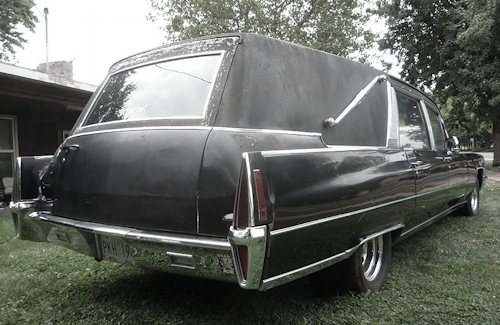
He reluctantly agreed to put off confronting our stalkers, and suggested we proceed by way of Biloxi to primeval Carcosa, which he explained was in Orleans Parish, Louisiana.
“Shouldn’t be hard to find.” He fumbled in his coat pocket. “I have a map. Drew it myself. Somewhere.”
“Don’t bother, Ambrose. I’ve got GPS on my phone.”
“What’s GPS?”
“Global... Ah, I’ll tell you later.”
“I’ve an old friend in Carcosa I’d like to revisit.”
“I thought Carcosa was a myth. And you started it.”
“Not at all. A myth is a belief invented by a primitive people—as distinguished from true accounts, which are invented later.”
As we navigated the Southern byways, Bierce gleefully related his remembrances of alligators enjoying a banquet of viscera, gardens of prancing unicorns, encampments of bellicose demigods, pedicabs jousting on saltwater boardwalks, the radiated whirl of a Ferris wheel, werewolves sharing a carcass under the moon, carousels orbiting to a calliope charm.
“I think we’ve driven enough for the day,” he said. “Perhaps we might beg accommodations from some generous farmer, or even persevere until we locate a village with an inn.”
“We can do better.”
On my phone, I tapped in the word hotel and the GPS revealed the nearest options, the closest being Rosey’s Cozy Motel and Diner, just a mile ahead. Perhaps not the best choice, but Ambrose was bushed and had to piss.
We checked in, and later at Rosey’s diner he flirted with the waitress, a corn-fed miss with bangs who was about 150 years younger than he. He beguiled her, of course, using aphorisms, literary references, and poetic allusions. What rural of the female persuasion wouldn’t have been seduced, especially a comely yet hard-scrabble server in Oblivion, West Virginia.
“She’s too young for you, Ambrose,” I hissed after she deposited our order on the table.
“What’s youth but the time when pomegranates thrive on evergreen trees, pigs sport bowties and square dance, cows attach wings to deliver butter and eggs, and assassins croon lullabies to babies. I certainly have the opportunity, not to mention the vigor, to accompany my sordid intentions.”
Which he obviously took advantage of, disappearing with the young woman after she got off duty, he not returning to our motel room until dawn.
“You old rascal,” I growled.
“A rascal’s a fool considered under another aspect, so I’m astonished that you consider me one.”
“Did you... you...?”
“Did I what?”
I plopped the pillow over my head.
“In case you’re wondering, Donald, the young woman actually spoke a pattern of English, much of which I was able to interpret. We spent the night playing a game called Clue, after which we became quite chummy, I calling her Miss Scarlet, she referring to me as Colonel Mustard.”
OK, I admit I was jealous of the old lexicographer. I possessed an appendage similar to his, although I obviously didn’t know how to advertise it.
Later in the morning after leaving the room, again we saw the SUV that had been haunting us. This time, Bierce knocked on the windows, first on the passenger side, then the driver’s. No response. He tried the doors. Locked. I placed my hand on the hood, which was cold.
“Feels like it hasn’t been driven for awhile, Ambrose. Apparently, there’s no one inside.”
“Perhaps if we break a window...”
“That could land a couple of Yankees like us in the local hoosegow.”
Back in the van, we pulled onto the highway. I was outraged when I saw in the rear view mirror the SUV, which seemed to have materialized from nowhere. It was immediately behind us.
“A damned ghost car,” I said.
“The only ghosts I know are in my stories.”
“They won’t give up.”
“I shall deal with our pursuers at the appropriate time.”
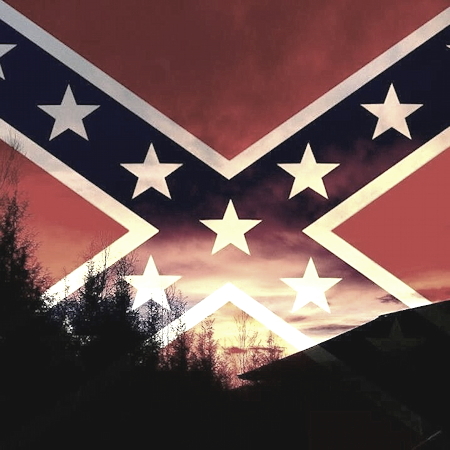
We entered the deep Deep South, the cypress and tupelo of the Okefenokee, courthouse clock towers and church steeples, town squares and cranberry bogs, junked cars and discarded tires, yards with gaping refrigerators and dead televisions, drag strips and motor speedways, cotton rows and chicken farms.
Near Chattahoochee Hills, Georgia, we were confronted by a fire-breathing lizard.
At least I thought we were. Maybe I dreamed it. I wasn’t getting a lot of sleep, tossing and turning in the cheap motels we stayed in.
Perhaps it wasn’t an actual lizard either, but the thing was decidedly reptilian, with four stumpy legs, clawed feet, luminous eyes, and at least thirty feet in length not counting the tail. The creature blocked the highway, and I had to jam on the brakes to halt the car in time. We might have been rear-ended by the sinister SUV but it came to an expert stop behind us.
The beast spewed an arc of flame, which worried me because I just had the car detailed.
“That’s one hell of a lizard,” I said to Bierce.
“It’s not a lizard. It’s a Runevard.”
“What’s a Runevard?”
“Obviously the beast before your very eyes. Runevard look dangerous, but they’re harmless. Must have escaped from the menagerie of antique imagination. I’ll handle this.”
“No, Ambrose, it breathes fire.”
“All for show. I also breathe fire.”
Bierce left the van and approached the Runevard, which reared on its hind legs and huffed a stream of flame.
Waving away the subsiding heat like an annoying odor, Bierce yelled to the beast, “Scat. Scat. Go home. Home, I say. Scat or I’ll...”
The Runevard, cowed, obviously took Bierce seriously. It retreated, fading into the fog, leaving behind the odor of sulfur.
I was shaken by the sight of such a monster, only occasionally seen on Southern highways, usually as roadkill.
When Bierce returned to the car, he said, “You might have noticed that the operative term was scat. Whenever the Runevard hear that word...”
I said, “I was too cowardly to confront the monster—unlike you.”
“I believe you’d rise to the occasion, Donald. A coward’s one who in a perilous emergency thinks with his legs, but you stayed put.”
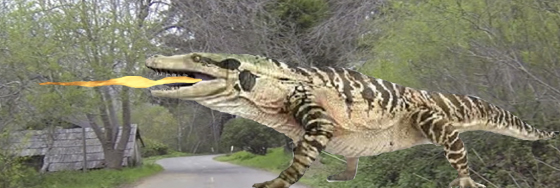
Back on the road, we passed Spanish moss dangling like the beard of Hiram Walker, mountains of ravenous kudzu, statuary honoring traitorous rebel generals in the guise of patriots, shacks of unregistered immigrants, sprawls of double-wide trailers, the world’s largest peanut, water towers and silos, shapeless women, unshaven men with bloated beer bellies, roadside stands selling watermelon and live bait, grotesque Confederate battle flags hanging defensively as if over their own republic.
In the parking lot of a Bojangle’s Famous Chicken ’n Biscuits, I said, “I’ve something to show you, Ambrose.”
With trepidation, I handed him my iPad on which I had downloaded a free text version of “An Occurrence at Owl Creek Bridge.”
“Was the deuce is this? My own words conveyed on some sort of luminescent screen? I suspect it’s your way of displaying evidence that paper, ink, and bindings have become extinct.”
“It’s merely another reading option.”
“Ink, which I wasted in enormous quantities, is vital to civilization, although in general ink’s a villainous compound of iron, gum arabic, and water aimed at facilitating idiocy and promoting intellectual crime.”
“The important thing, Ambrose—idiocy, intellectual crime, and ink aside—is that you’re still being read.”
“Which means I’m still receiving my royalties?”
“Uh, I have some awkward news about that.”
As we entered Biloxi, Bierce insisted we stop to engage in some gambling, so we checked into the Dead Heron and Pirate Casino and Resort, where I staked him for his first foray into the spell of the slots.
“Gaming has certain pleasures for oneself,” he told me, “but I enjoy it chiefly in contemplation of another’s loss.”
“That’s not funny.”
“Nor was it intended to be. Funny’s the quality of merriment when one opens the front page of a Hearst newspaper.”
I didn’t have the heart to tell him that no Hearst paper survived in any major city but San Francisco, and it wasn’t even the Examiner, his old employer, but the competing Chronicle. I knew word of the slow death of ink and print newspapers would be too depressing for the old muckraker, so I spared him.
At the slots, he won the jackpot on his first pull, then the second, and the third. After which he used his haul to win at roulette, baccarat, Mississippi stud, and Texas hold ’em. He had to stuff an oversized suitcase, which he sent me out to buy, to accommodate his stash in huge bills. It nearly bankrupted the Dead Heron, whose security guards discreetly escorted him and his winnings to the Mississippi Sound and ordered him never to return, that his very image made him persona non grata at every casino in America, the Caribbean, and the south of France.
“Ambrose, you’ve got enough loot to last for the rest of your life,” I said.
“A life’s merely a spiritual pickle preserving the body from decay, Donald, but as you noticed mine seems impervious to decomposition. Much like my authorship.”

Down from a Walmart in Picayune, Mississippi, we celebrated at a bona fide honky-tonk, where he discovered a vintage jukebox, all chrome and plastic, copper and nickel, glass and bubble tubes. It generated enough noise to wake the inhabitants of Carcosa.
“Donnie, old chum, kindly pass me additional bills to feed this orchestrion. I want to hear more of Willy Nelson and Trace Adkins. And who’s this Patty Loveless? I’m in love again, if that’s the proper term.”
“I thought you hated love.”
“A temporary insanity one easily overcomes after the miscalculation of dim lights, soft music, mild intoxication, and marriage.”
Every woman I ever loved had left me, and now I was old. Bierce, too, had a checkered past regarding relationships, yet he seemed to be impervious to the notion of love, despite his flippant juke box assertion. Love, I knew, wasn’t an intellectual pursuit, but something strange and different, although I wasn’t astute enough to know exactly what that was. Bierce, understanding the impossibility of intellectualizing romantic affection, didn’t bother.
At first, admittedly, I’d been intimidated by this outworn lexicographer, but now I was personally attached to him. My own father had been distant, rarely seen except for occasional weekends. But Bierce was—how do I put it?—not only witty but a hoot, intelligent yet unaffected. Even affectionate, in his acerbic way. Occasionally, he called me Donnie, something only my grandmother did until the day she died.
But would he have thrown a ball to me when I seven?
Bierce was feeling no pain, discarding his Martell for the local beer.
“Next time you’re up, get me another bottle of Barrel Aged Mississippi Fire Ant.” He chuckled. “Say, do you want to know when you’re in Heaven?”
“I’ll bite.”
“Pardon the vernacular, but it’s when the imbeciles finally shut the fuck up.”
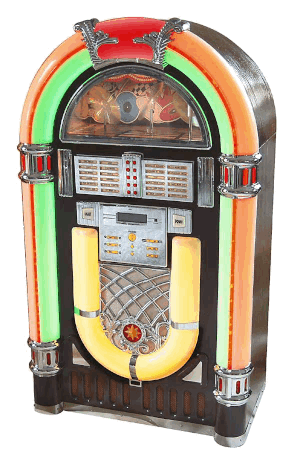
He wanted to purchase some souvenirs, so we stopped at a shop that sold antique snuffboxes and Confederate swords. He ended up buying the store’s entire inventory of snuffboxes, which he said he’d have shipped to him after he determined the appropriate street address.
“I’m surprised, Ambrose. Snuff is out of style.”
“But the boxes are useful for storing the ashes of my critics.”
It was too complicated to tell him about e-cigarettes.
Bierce was anxious to push on to Carcosa, so we entered Louisiana by interstate, crossing Lake Pontchartrain, and arriving in Orleans Parish via the Chef Menteur Highway.
“This place doesn’t look promising, Ambrose. It’s shabby. Can I trust your judgment?”
“Trust is friendship, Donald.”
“And that’s the truth?”
“One who is truthful is dumb and illiterate. Do you think that applies to me?”
What the hell. From the start I bought into his story, so how could I resist now?
We parked and left the van. Despite its proximity to the Hi Tide Bar and Grill and South Shore Bait and Marina, the locale, a kind of peninsula, was desolate and scrubby. A low and ineffective chain-link fence and myriad no-trespassing signs thwarted us.
“We better go back, Ambrose.”
“No time to run scared. I know something about logistics. I was once a military topographer.”
As we climbed over the fence and maneuvered along a narrow dirt road I noticed the decaying remains of what, clearly, had been a fortification, no doubt dating to another century.
“Some sort of military stronghold?” I asked.
“One of Carcosa’s finer attributes, Fort Macomb, long abandoned. But that’s not why we’re here. Few people know the whereabouts of what you’ll be privy to.”
He led me off the path through scraggly trees and underbrush, which buzzed with insects unintimidated by the incursion of mere humans, assuming Bierce was human. He didn’t complain, but the mosquitoes ate the bejesus out of me.
Where was he ushering me? Knowing him, it could be convocations of jesters, fairies, ghouls, gypsies, gnomes, griffins, a gospel tent filled with carnival freaks, even cigar-store Indians on the warpath. At any moment I expected to hear jungle sounds or the beat of tom-toms.
“Ah, still here,” he said.
A small graveyard in despicable disrepair. Toppled headstones, a few above-ground mausoleums in near ruin. Long forgotten, nearly erased by time. Bierce walked gingerly among the decomposing monuments, scrutinizing what remained of the stones.
“What are you looking for in this hellhole, Ambrose?”
“A thing written on another thing.”
“You mean an inscription?”
“Found it,” he said, triumphant.
“Did you know whoever was buried in this tomb?”
“Undeniably. Observe for yourself.”
I got on my knees and brushed away the dirt and grime to reveal the faded name on the stone.

I shrank in horror.
“Control yourself, Donald. A tomb’s merely a house of indifference.”
“Have I gone mad?”
“To be mad is to be afflicted with a high degree of intellectual independence. Have you noticed that those who pronounce others mad never provide evidence that they themselves are sane?”
“You’ve scared enough readers with your ghost stories. Guess I shouldn’t have been surprised by this.”
“Then my labors have been accomplished.” He nodded in satisfaction. “I think we’ve had sufficient merriment for now.” He helped to pull me to my feet. “Shall we abandon the mosquitoes in peace? They’re only mission is to survive as blood suckers, rather like politicians.”
We worked our way back to the car—and, sure enough, there was the black SUV, this time parked in such a way as to block our escape.
“By the saints,” Bierce said, “I’m going to shoot out the damned windows.”
As he reached for his .45, the SUV’s front doors slowly opened and out stepped two men, dressed, like Bierce, in black, their clothes anachronous as if from another time.
“Señor Bierce,” said one of the men.
“Rudolfo,” Bierce said.
“You know this guy?” I whispered.
“An old acquaintance. Met him in Mexico. Although we weren’t close. Name’s Rudolfo Fierro. The other’s Tomás Urbina.”
“Tomás,” he said to Urbina, who nodded in response.
“Should have known it was you two,” Bierce said. “You both were astride horses the last I saw you. Why the hell have you been following us all this time?”
Fierro said, “Why, gringo, we simply wished to ensure your safety while on the dangerous highways of this violent, poverty-stricken nation, crowded with defilers of women, savage dope peddlers, mass murderers, and a leader who seems to be mentally impaired. We wanted to be here when the time came to take you back. And now it is time is it not?”
“I believe you’re correct, Rudolfo.”
“Wait a minute, Ambrose,” I said, “you’re not going with these guys, I don’t care wherever the hell they wanna take you.”
“Mexico, Donald, Mexico. I miss it sorely. They’re soldiers, revolutionaries, although I don’t always agree with their tactics. But reality is the dream of the mad philosopher, and I must come to terms with it. There are simply too many uncomfortable changes here for me to fathom. Yours is a world set too far apart from mine. Every man has his sunshine, and I’ve been blinded by mine.”
“But there’s more to understand since you were here in your prior life, the good and bad. America’s unstoppable wars, some honorable, others unjust. Torture in the name of victory. Political witch hunts. Economic collapse and breadlines, fiscal revival, the ascendency of both billionaires and the poor. Silicon wealth, rust and rage. Jim Crow. Gay and transgendered persecution. A homicide rate exceeding the entire populations of lesser nations. The self-driving car. Presidential elections advancing the most noble of leaders—and the least. And should I mention antibiotics?”
“Donald, the nation of our nativity and its honorability in the world is best left to the moralists, but it would take me too long to absorb. I paid my dues. Unlike a good Christian, I knocked on your door with an open mind. But now I wish to return to a simpler life. A bottle or two of tequila each day, a willing señorita in my bed at night, the undemanding songs of the mariachis, uncomplicated meals of red beans and yellow rice, the taste of a tortilla freshly pounded by hand on a stone by an anciana. I’m no longer willing to fight endlessly the miscreants who thieve under the guise of public service, the mediocrity of the bestseller lists, street thugs who think so little of themselves that they casually extinguish the lives of their betters, and the simpletons who claim that they were elected by God to tell us the truth.”
“But all that money you won...”
“It’s yours, Donnie lad. Use it in good stead. Buy yourself a new van, a new wife, a better life.”
“I’m too old for a better life.”
“Don’t deny yourself. The world’s still waiting for you in ways it never would for me. Deeply I appreciate your hospitality and your skill as a chauffeur. I might return from time to time to make sure you’re—what was it poor Clem said?—with the program.”
With that he entered the SUV with the two Mexican firebrands, and the car backed into the infinite Louisiana haze, stifling, tainted by the odor of oil slicks, the rotting corpses of dead fish and dead men, sinking inevitably into the saltwater that only burial would purify.
Thus, the finality of Carcosa.
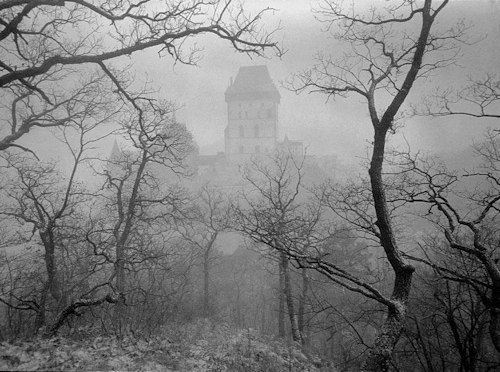
Dizzy, I returned to my Dodge. On the front seat was the valise bulging with Bierce’s winnings. For the first time in my miserable life I was a wealthy man. Now I could buy my way out of my morbidity. Unable to resist, I reached into the suitcase to run my fingers through the money as I might the silky hair of a seductive lover.
All I felt was a handful of dust.
Don Swaim is the author of The Assassination of Ambrose Bierce: A Love Story
published by Hippocampus Press, New York.
Top of Page
|
